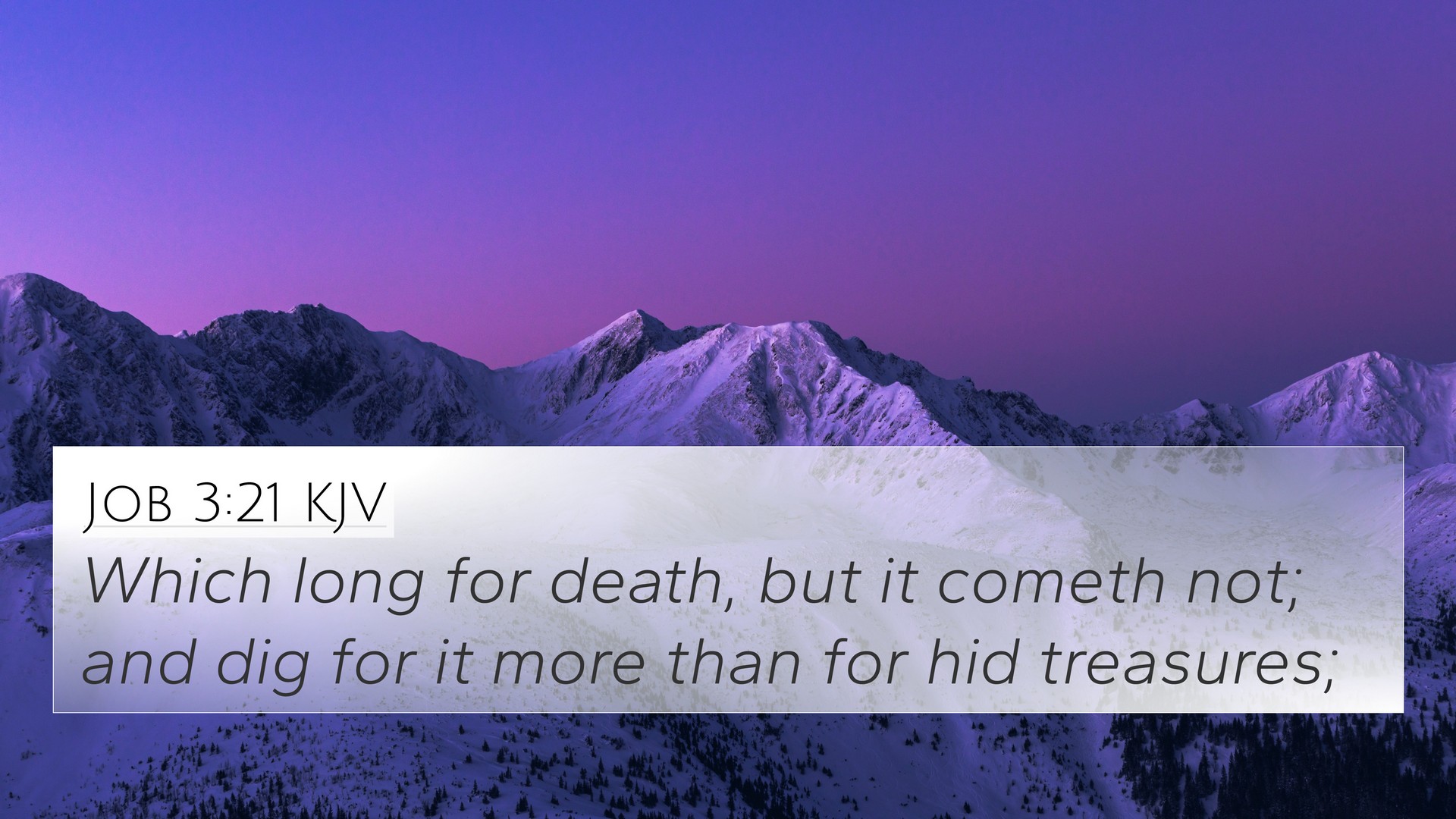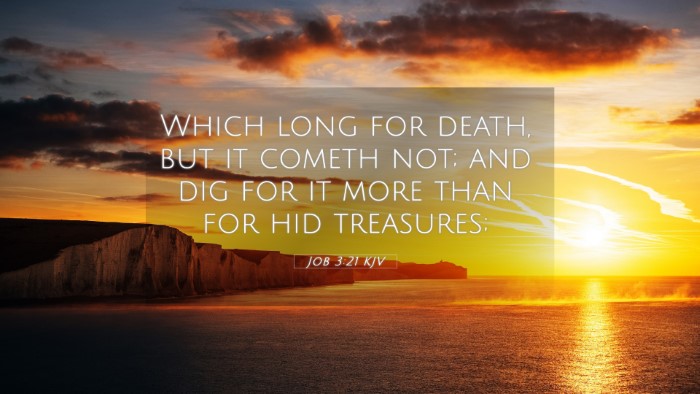Old Testament
Genesis Exodus Leviticus Numbers Deuteronomy Joshua Judges Ruth 1 Samuel 2 Samuel 1 Kings 2 Kings 1 Chronicles 2 Chronicles Ezra Nehemiah Esther Job Psalms Proverbs Ecclesiastes Song of Solomon Isaiah Jeremiah Lamentations Ezekiel Daniel Hosea Joel Amos Obadiah Jonah Micah Nahum Habakkuk Zephaniah Haggai Zechariah MalachiJob 3:21 Similar Verses
Job 3:21 Cross References
Which long for death, but it cometh not; and dig for it more than for hid treasures;
Uncover the Rich Themes and Topics of This Bible Verse
Listed below are the Bible themes associated with Job 3:21. We invite you to explore each theme to gain deeper insights into the Scriptures.
Job 3:21 Cross Reference Verses
This section features a detailed cross-reference designed to enrich your understanding of the Scriptures. Below, you will find carefully selected verses that echo the themes and teachings related to Job 3:21 KJV. Click on any image to explore detailed analyses of related Bible verses and uncover deeper theological insights.
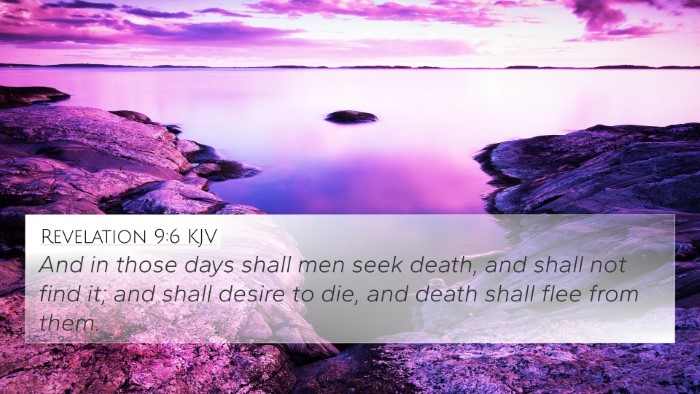
Revelation 9:6 (KJV) »
And in those days shall men seek death, and shall not find it; and shall desire to die, and death shall flee from them.

Numbers 11:15 (KJV) »
And if thou deal thus with me, kill me, I pray thee, out of hand, if I have found favor in thy sight; and let me not see my wretchedness.
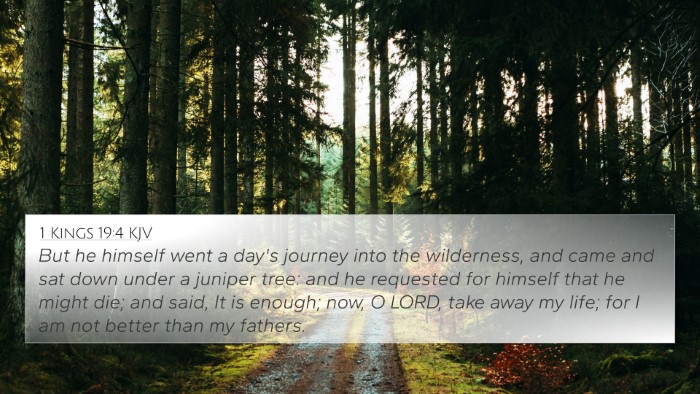
1 Kings 19:4 (KJV) »
But he himself went a day's journey into the wilderness, and came and sat down under a juniper tree: and he requested for himself that he might die; and said, It is enough; now, O LORD, take away my life; for I am not better than my fathers.

Jonah 4:3 (KJV) »
Therefore now, O LORD, take, I beseech thee, my life from me; for it is better for me to die than to live.
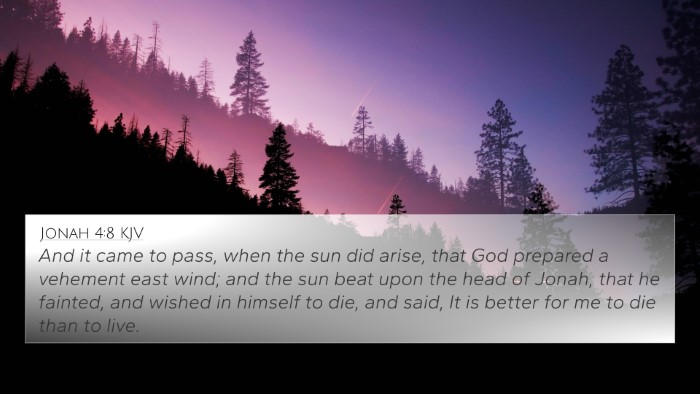
Jonah 4:8 (KJV) »
And it came to pass, when the sun did arise, that God prepared a vehement east wind; and the sun beat upon the head of Jonah, that he fainted, and wished in himself to die, and said, It is better for me to die than to live.
Job 3:21 Verse Analysis and Similar Verses
Understanding Job 3:21
Verse: Job 3:21 – "Why is light given to a man whose way is hid, and whom God hath hedged in?"
This poignant question from Job speaks to the depths of human suffering and the quest for understanding amidst pain. Let's explore the insights drawn from public domain commentaries.
Commentary Insights
Matthew Henry's Commentary
Matthew Henry reflects on the intense struggle Job faces. He notes that this verse captures Job's longing for hope and understanding in a time of despair. Henry emphasizes that Job feels trapped by the circumstances around him, likening it to being "hedged in" by divine providence. Job's question about light highlights the human desire for clarity and hope, especially when life's path seems dark and obscured by pain.
Albert Barnes' Commentary
Albert Barnes builds upon Henry’s insights, expanding the emotional context of Job's plea. He interprets the "light" as not just physical sight but a metaphor for purpose and meaning in life. Barnes comments that Job’s question reflects a broader existential inquiry about why life continues to unfold under such oppressive circumstances. In a world where suffering exists, Barnes suggests that Job seeks understanding from God about the purpose of pain and the silence of divine intervention.
Adam Clarke's Commentary
Adam Clarke offers a slightly different analysis, focusing on the implications of being "hedged in." He points to the feeling of isolation and the yearning for release that pervades Job’s words. Clarke implies that Job’s questioning is an avenue towards spiritual validation of his suffering. It becomes a moment of crying out for God's presence during trials, which resonates with the human experience of seeking reassurance in faith during suffering.
Cross-References for Job 3:21
Connecting Job 3:21 with other scripture offers deeper insight into its themes of suffering, despair, and the quest for understanding. Here are several biblical cross-references:
- Psalms 88:18: "Lover and friend hast thou put far from me, and mine acquaintance into darkness." - Reflects the profound isolation felt in despair.
- Psalms 10:1: "Why standest thou afar off, O Lord? Why hidest thou thyself in times of trouble?" - Expresses a similar sense of feeling abandoned in suffering.
- Ecclesiastes 6:3: "If a man beget an hundred children, and live many years, and so the days of his years be multiplied, and his soul be not filled with good, and also that he hath no burial; I say, that an untimely birth is better than he." - Addresses the futility of life when devoid of purpose.
- Isaiah 45:15: "Verily, thou art a God that hidest thyself, O God of Israel, the Savior." - Acknowledges God's hiddenness, resonating with Job's experience.
- Romans 8:28: "And we know that all things work together for good to them that love God..." - A reminder of hope amidst suffering that connects with the desire for light and clarity.
- 2 Corinthians 4:17: "For our light affliction, which is but for a moment, worketh for us a far more exceeding and eternal weight of glory." - Offers an assurance that affliction serves a purpose.
- 1 Peter 1:6-7: "Wherein ye greatly rejoice, though now for a season, if need be, ye are in heaviness through manifold temptations..." - Discusses the purpose of trials in faith.
Thematic Connections
The themes presented in Job 3:21 resonate with various biblical narratives that intertwine vulnerability, divine silence, and the search for meaning:
- Suffering and Isolation: As seen in the laments of David and the cries of Job, the human experience often includes deep loneliness amidst trials.
- The Search for Hope: Across the scriptures, characters like Job and David exhibit a hunger for reassurance from God, emphasizing the need for divine comfort.
- God's Sovereignty in Suffering: The idea that suffering is part of God's greater plan is highlighted in Romans 8:28 and echoed through various biblical writers.
Inter-Biblical Dialogue
Job's plight is not an isolated narrative; it dialogues with other stories within scripture. Understanding these connections can provide richer insights:
- The Story of Joseph: Like Job, Joseph faced betrayal and hardship but ultimately saw God's plan unfold in a way that was initially unknowable.
- The Apostle Paul: Paul often spoke of suffering as a means to greater faith (2 Corinthians 12:9-10), paralleling Job's reflections on his anguish.
- The Prophets: Many prophets faced isolation as they delivered God's messages (e.g., Jeremiah's lament), reflecting the deep emotional struggles present in Job's experience.
Conclusion
In summary, Job 3:21 encapsulates the existential struggle of humanity facing unexplained suffering. Integrating insights from respected commentaries reveals a layered understanding of despair, hope, and divine purpose. Through careful cross-referencing, we can see how this verse resonates with the broader biblical narrative and offers a pathway to understanding the complexities of life, God’s character, and the enduring quest for meaning in suffering.
